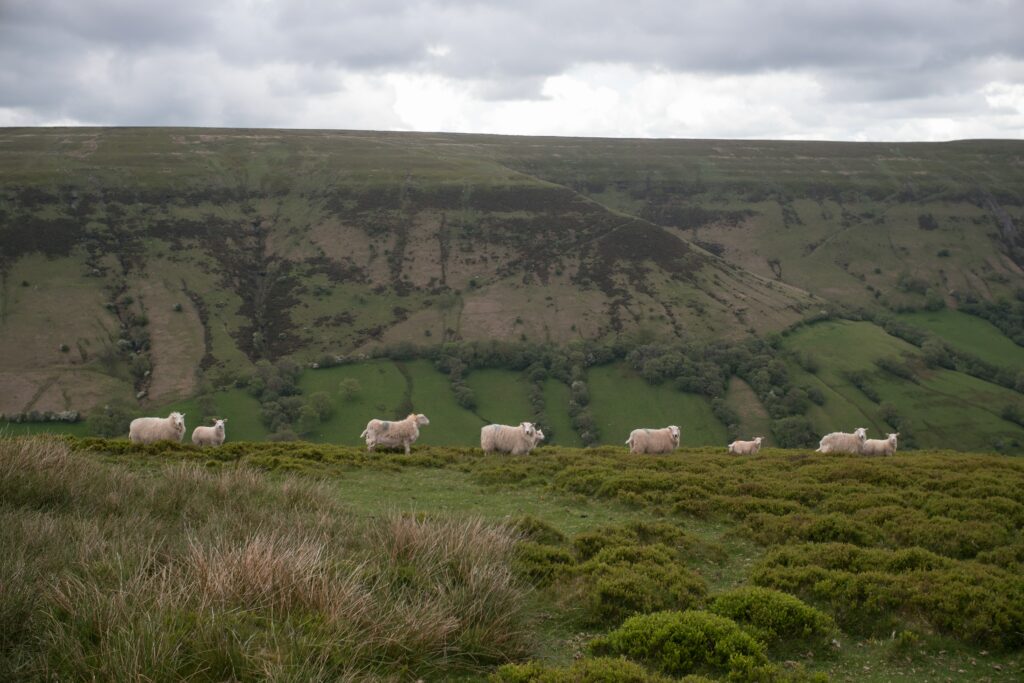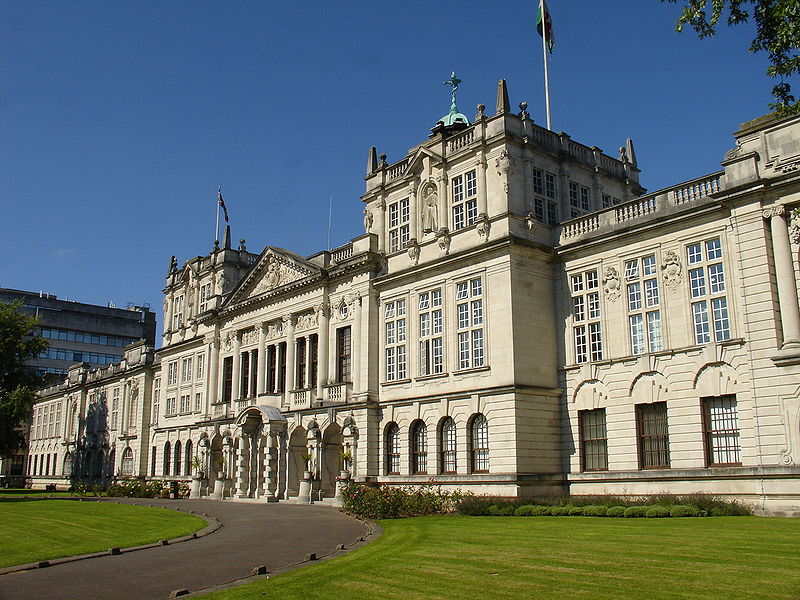Julie Brominicks finds common ground between livestock farmers and environmentalists regarding the climate emergency and biodiversity crisis
Alerted more by instinct than sound, I peered through a hedge and deciphered a farmer’s whispered commands to dogs whirling sheep into a pen. It was 2012 and I was just embarking on my walk around the edge of Cymru. Moments like this excited me. I knew a few farmers but didn’t know their magic.
Farmers seemed elusive, poetic perhaps, embedded in the Welsh-language culture I admired. I respected their hard graft, sheer grit, and care for tradition, family and community. Meanwhile I had quit my teaching job at the Centre for Alternative Technology (CAT) in Machynlleth, to become a writer. My ex-colleagues, many of them incomers like myself, also worked passionately – attempting to reverse biodiversity loss and avoid extremely dangerous climate breakdown.
My walk led me to consider these two communities and the common ground between them. But I set off with angst. Firstly, I wasn’t sure how us eco-immigrants were perceived. Too busy at first, I’d not spent much time learning Cymraeg or about Cymru’s history (something I’ve since rectified). Secondly, escaping environmental concerns wasn’t easy. Teaching people who were seeking solutions had shielded me from the ‘real world’ where most people seemed unwilling to even acknowledge the crisis.
Back in 2012 the relationship between farmers and environmentalists seemed fragile. The 1970’s CAT pioneers had been ridiculed – most farms had not long been connected to the National Grid so the idea of returning to the hydro power they’d ditched seemed absurd. Few people anywhere then, recognised the dangerous path humanity was taking. I wasn’t yet aware that upland farmers had come to respect CAT for its work promoting renewable energy that now gave them an important income. In 2014 I interviewed Dewi Owen from Esgairgyfela about his wind turbine. ‘Farming is all about long-term thinking’ Dewi said. ‘The wind turbine here will generate an income which will enable the family to carry on farming.’
Both farmers and environmentalists love the land and fear it will change for the worse.
The incoming environmentalists had proved their worth and put down roots. But there was another terrible problem. Livestock farming was contributing to the environmental catastrophe. Nitrogen fertilisers emit nitrous oxide – 300 times more powerful a greenhouse gas than carbon dioxide. Feed supplements of grain and soya are generally grown in plantations for which rainforest has been felled. Significant energy, water and land is required to produce meat – even organic meat. The UK cross-government programme on food security research published ‘The Carbon Footprint of High Protein Food’ in 2017. It found 1kg of lamb was responsible for 48kg of CO2 equivalent (CO2e – means all greenhouse gases), 1kg beef produced 32kg of CO2e, pork 6kg, poultry, eggs, tofu and Quorn 3kg, and pulses (beans and lentils) 1kg. For Cymru, where beef and sheep farming is part of the cultural and physical landscape, this is devastating. Would the relationship between environmentalists and farmers survive?
It was threatened by the emotive debate around veganism. It wasn’t helped by the discourse around rewilding, which worried farmers that livestock-attacking predators might be re-introduced, that 20th–century Forestry Commission-style land-grabs might be enforced, and most insultingly, amid calls for huge areas of grazing land to be abandoned, that farmers might become redundant.
Innovative. Informed. Independent.
Your support can help us make Wales better.
There was plenty to consider on my journey. Farmers were visibly present on the land compared to other people, but nothing like when George Borrow strode around Cymru in 1854, meeting scores of reapers, swine-men and drovers. I felt lucky to receive a wave from a distant figure tossing hay to sheep from a quad bike. Farmers too seemed endangered, their existence as fragile as the Welsh language, biodiversity and climate. But these concerns are not separate entities. Action on one benefits all.
I believe the relationship is less polarised than it appears. Both farmers and environmentalists love the land and fear it will change for the worse. Furthermore, according to a CAT-led research team in ‘Zero Carbon Britain; Rising to the Climate Emergency’, while vastly reducing the amount of meat and dairy produce we eat is essential, veganism is not. Significant reforestation is required, but a role for free-ranging cattle remains.
I’ve yet to meet a farmer who doesn’t know that livestock numbers need to be reduced – but their pain and worry must be acknowledged. Livestock has been prevalent in Cymru for millennia – especially when the climate was poor and crops difficult to grow. In the colder wetter Iron Age for example, we humans became more livestock-dependent, retreating from the hilltops which Bronze-Age farmers had deforested for grazing and growing crops in milder weather. Farmers are heavily livestock-reliant now due to post-WW2 subsidies (necessary because of the artificially cheap price of oil underpinning and affecting the entire infrastructure). Until recently, farmers were also self-sufficient in vegetables they produced alongside their dominant market commodity. Many remember those days. ‘They were hard’ they tell me, ‘but first and foremost we’re food producers.’
History also demonstrates (as do contemporary community enterprises and organic farms) that Cymru can produce fruit, vegetables, cereals and even legumes, though not as easily (with climate chaos) or cheaply (with subsidies) as livestock. But survival demands resilience and resilience demands diversity. Change is stressful but necessary. In 2018 Wyn Evans, NFU Vice Chair for Livestock told me:
‘Though livestock will always be a prominent force in upland areas and where it has been traditionally reared, we know the ground will have to be shared with alternative foods, such as more substantial crops to feed our livestock and more locally grown fruit and vegetables to service local communities. But we need a guaranteed market for that produce.’
It’s easy to blame big companies, politicians, farmers. We shoppers too have bad habits. We need to provide that market.
On my walk I saw thousands of lambs, yet sales have plummeted. The British Muslim community and exports to the EU kept the industry afloat. We need to consume substantially less meat and dairy – and buy it locally. But we want food cheaper than it costs to produce. We have skulked around supermarkets for special offers. Now the supermarkets control the market and many people are in real food poverty.
Discussions and debates that drive Wales forward.
Join Wales’ leading independent think tank.
In 2019, signs appeared on the hills around Machynlleth in Cymraeg and English saying ‘Yes to Conservation – No to Rewilding’. The conversation continues as the climate emergency escalates. But if I’ve learned one thing from environmentalism, it’s this – face the truth but keep the faith. It takes guts to face catastrophe, and strength to embrace change – qualities Welsh farmers have in spades.
What will the future bring? I imagine seaweed and shellfish cultivated on a busy coast. Poly-tunnels of fruit and vegetables, arable crops worked by reapers and sowers, farmers waving from machines powered by home-grown bio-fuels. Herders leading small flocks of sheep and goats to remote uplands, and free-roaming cattle browsing woodland pasture like herbivores did, after the glaciers’ retreat. Real grassland with long root systems that store carbon, reduce soil erosion, alleviate flooding and nourish micro-organisms in the soil. Grassland which supports diverse flora, invertebrates, birds and mammals, as well as livestock. Pigs in the woods, foresters planting and harvesting timber, and the whole lot linked by wildlife-rich field-margins, hedgerows and woodland corridors. Farms full of people and wildlife. It can happen. If we unite.
All articles published on the welsh agenda are subject to IWA’s disclaimer.





